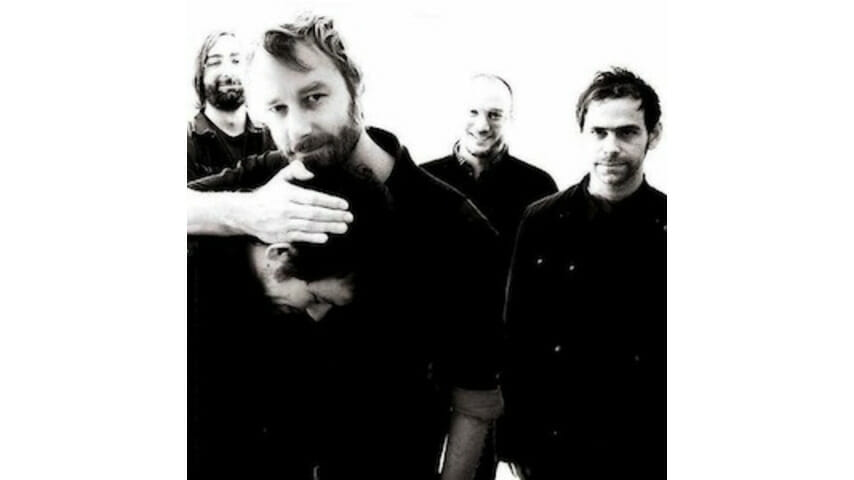Boxer’s opener, “Fake Empire,” set the tone for that album with gently syncopated piano chords that reinforced the song’s theme of blocking out the ugliness of the world by distracting oneself with cheery fantasies of bluebirds and diamond slippers. High Violet echoes that approach as opening track “Terrible Love” announces itself with a muddy guitar churn, later boasting a gorgeous series of background choral “oohs.” But as the song progresses, all signifiers of beauty are paved over with menacing guitar fuzz and clattering percussion. It’s a grim, ramshackle, singularly uninviting welcome. And the tune’s sharpened incisors leave a mark as Matt Berninger sings about insomnia: “Without a little help, it takes a while to settle down.” It’s easy to imagine this swirl of discordant noise representing the narrator’s psychological unrest—the opposite of the “rosy-minded fuzz” mentioned in Boxer single “Apartment Story.”
Still, the album opens sluggishly, especially coupled with second track “Sorrow.” When a band’s music relies this heavily on nuance, the line separating hum-along from just ho-hum narrows considerably, and it’s a credit to The National’s creative instincts that they’ve stayed mostly on the winning side of that dichotomy. High Violet is front-loaded with its two most unremarkable tracks, but despite those early missteps, it maintains that balance between light and dark shades, the balance that has defined and sustained the band’s work all along. The album eventually hits its stride with “Anyone’s Ghost,” a fun, lightly bouncing riff that features Bryan Devendorf’s most infectious drumming to date. Played live, it won’t get the crowd dancing, but it’s guaranteed to get every head in the place nodding.
Just as it’s hard to imagine Leonard Cohen rattling off a sticky pop ditty, Berninger possesses a set of a pipes divinely crafted to luxuriate in sad-bastard music. Another gift sets him apart from rock’s legions of mopey minstrels: a pitch-black sense of humor so finely tuned that even the most sullen-sounding lyrics can’t mask the rich vein of sardonic bemusement coursing just beneath the surface. Amid the insistent see-sawing groove of “Lemonworld,” Berninger sings “I gave my heart to the Army, the only sentimental thing I could think of / Cousins and cousins somewhere overseas, but it’ll take a better war to kill a college man like me.” Later, in “Conversation 16,” the narrator airs a laundry list of personal misgivings that range from mundane (“Try to hold it together till our friends are gone / … Do not want to disappoint anyone”) to flat-out bizarre (“I was afraid I’d eat your brains, ‘cause I’m evil.”)
Other highlights include recent live favorite “Bloodbuzz Ohio,” which showcases one of Berninger’s signature vocal tricks—he compensates for his lack of melodic range by varying his delivery, clinging to each word a second longer than you expect before delivering the next.
Though High Violet lacks the front-to-back consistency that made Boxer such an unmitigated revelation, the new album’s peaks absolutely rival Boxer’s best tracks. The National’s unique brand of torture-chamber pop and fascination with 21st-century paranoia and psychological unrest provide an evocative thematic template; it’s not a blueprint for mainstream crossover success, but High Violet has the potential to elevate the band’s profile. If the characters Berninger creates suffer from year-round seasonal affective disorder, it’ll be interesting to see if the spotlight snaps them out of it.
